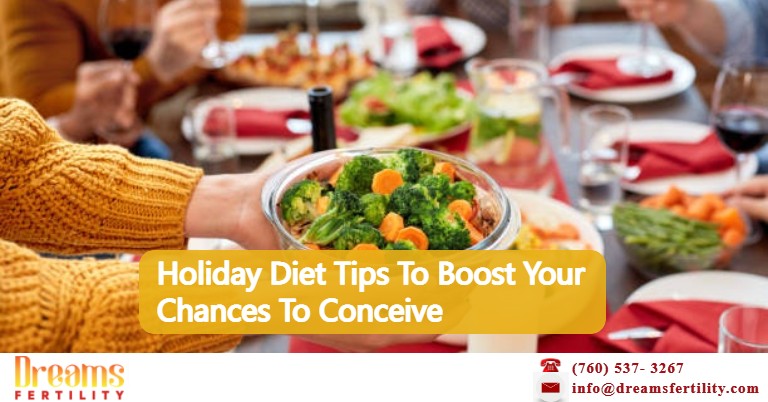The holidays are a time for indulgence, but if you’re trying to conceive, you may be wondering if you need to adjust your eating habits. This could even be something that your fertility specialist will tell you any time of year.
A fertility-targeted diet is important to the entire fertility treatment process. . Even if you have recently started trying to conceive, you still need a fertility-boosting diet to increase your chances.
The good news is that you don’t have to deprive yourself of the holidays. There are plenty of holiday diet tips that can help you boost your chances of conceiving. From eating foods rich in folic acid to avoiding alcohol, here are some holiday diet tips to help you conceive.
Why What You Eat Matters When Trying to Conceive
When you’re trying to conceive, what you eat matters. A healthy diet can help improve your fertility and increase your chances of conceiving. This applies to both men and women. Male and Female fertility is closely associated with good physical fitness as well as a healthy lifestyle.
For women who are struggling with issues such as Polycystic Ovary Syndrome (PCOS), a balanced diet plays a key role in helping to lessen the symptoms. You need foods that can help with hormonal balance, reduce the risk of ovulatory infertility and regulate your menstrual cycles. Good food is also critical if you are struggling with obesity and are involved in weight loss routines. The same is the case with people undergoing fertility treatment using assisted reproductive technology such as IVF. In the case of male fertility, boosting sperm count and sperm motility is vital. A good diet helps you do this.
Here are a few things to keep in mind when it comes to your diet and fertility – no matter what time of year. .
Eat Plenty of Fruits and Vegetables.
Fruits and vegetables are packed with nutrients that are essential for fertility. They also contain antioxidants, which can help protect your eggs and sperm from damage. Antioxidants are great at reducing inflammation which can help with fertility. It also helps people with PCOS as it does not cause a spike in blood sugar and reduces the risk of insulin resistance and diabetes in the long term. Try to eat at least five servings of fruits and vegetables per day.
Get Enough Protein.
Protein is an important nutrient for fertility. It helps build and repair the cells in your body, including the cells in your reproductive system. It’s important to get at least 20 grams of protein per day from sources such as lean meats, poultry, fish, beans, and nuts. Replacing sources of animal protein with plant sources is also a great idea. Lentils, beans, and legumes are healthy sources of protein.
Limit Processed Foods and Refined Carbohydrates.
Processed foods and refined carbs can negatively impact fertility. They tend to be high in unhealthy fats, sugar, and calories, which can disrupt hormone levels and lead to weight gain. If you’re trying to conceive, limit processed foods and refined carbs as much as possible. Instead, focus on eating whole, unprocessed foods like fruits, vegetables, whole grains, proteins, and healthy fats.
Avoid Alcohol and Caffeine.
Alcohol consumption can reduce fertility in both men and women by affecting hormone levels and increasing the risk of miscarriage. Caffeine can also have a negative effect when trying to get pregnant.
Foods to Eat When Trying to Conceive
Certain foods can help boost your chances of getting pregnant. Here is a list of some of those foods to eat when trying to conceive.
Fortified Cereals
Cereals that are fortified with folic acid can help improve your fertility. Folic acid is a nutrient that’s important for the development of the neural tube. It can help prevent birth defects of the brain and spine. Including quinoa and other such millets can also be a great idea.
Leafy Green Vegetables
Vegetables like spinach and kale are rich in Calcium, Iron, and folate, nutrients that are important for the development of the neural tube. Eating leafy greens can also help reduce the risk of birth defects.
Citrus Fruits
Citrus fruits are a good source of vitamin C, which is important for fertility. Vitamin C can help improve egg quality and increase sperm motility.
Berries
Berries are packed with antioxidants, which can improve fertility by reducing inflammation and oxidative stress. They are also rich in Zinc which is essential for reproductive health. Blueberries, raspberries, and strawberries are all great choices when you’re trying to conceive.
Fatty Fish
Fatty fish like salmon, sardines, mackerel, and herring are good sources of omega-3 fatty acids, which have been shown to improve fertility. Omega-3 fatty acids can improve egg quality and increase blood flow to the reproductive organs.
Full-fat Dairy
Full-fat dairy is known to be a great source of essential nutrients for women who are looking to conceive. Saturated fats, Vitamin A, Vitamin E, Vitamin D, Vitamin K, and of course a healthy dose of calcium– all of this can help! Compared to low-fat dairy, whole milk is found to be more effective. Rely on dairy products such as milk, and cheeses.
Honorable Mentions – Oysters, Eggs, Sunflower Seeds
A few more fertility superfoods to add to the list here. Oysters are a powerhouse of nutrients and can be a great addition to your holiday food list. It contains important nutrients like Selenium, Zinc, and Vitamin B12, not to mention their aphrodisiac properties which help with your efforts to conceive.
Egg yolk contains Omega-3 fatty acids like DHA and EPA, as well as Vitamin K2, A, D, and E. It also contains choline which can help prevent birth defects. Sunflower seeds are also a great source of Selenium and Folate, which are great fertility boosters.
Foods to Avoid When Trying to Conceive
When trying to conceive, it is important to be aware of the foods you are consuming. Certain foods can decrease your chances of conceiving and should be avoided.
Processed meats, such as bacon and sausage, are high in saturated fats and nitrates. These can increase your risk for ovarian cancer and endometriosis, both of which can decrease your fertility. Alcohol consumption can also impede fertility by affecting hormone levels and damaging the lining of the uterus.
Transfats are another thing to avoid while trying to get pregnant. Transfats affect insulin sensitivity and disrupt ovulation in women hence it is best avoided. Focus on healthy fats, including monounsaturated fats found in avocados and olive oil which can help boost fertility. Mediterranean food is a great choice when picking which restaurant to enjoy.
Caffeine has also been shown to reduce fertility. Too much caffeine can interfere with ovulation and lead to a higher risk of miscarriage. It is best to limit your caffeine intake to no more than 200 mg per day when trying to conceive.
Foods that are high in mercury should also be avoided when trying to get pregnant. Mercury can damage the nervous system and affect fetal development. Fish that are high in mercury include shark, swordfish, king mackerel, and tilefish. You should also avoid fish that have been exposed to pollution or other contaminants.
Tips for Sticking to a Healthy Diet
We all know that sticking to a diet is hard, especially during the holiday season when temptations are always found at parties, open houses, and family dinners. . You can certainly indulge in the festivities while keeping in mind the best holiday foods to eat. The key lies in moderation and of course, a commitment to get back to your diet as soon as possible.
Try to avoid processed foods and keep your carb intake limited. This is key. Even if you can’t refuse some of the unhealthy foods that your physician has asked you not to eat, add enough healthy foods to help keep your intake balanced.
Another idea is to snack on what your diet allows. Keep eating smaller meals during the day so that you are consuming in moderation and you do not find yourself over-indulging in an unhealthy diet. Drink plenty of water. Staying hydrated is important for both your overall health and your fertility during this holiday season.
Another thing to consider is adding supplements to your diet when you think you are not meeting your dietary nutrient requirements. These can be in the form of organic fertility foods such as maca, bee pollen, and other such items. It could also be in the form of tablets or vitamin drinks that the doctor suggests.
Conclusion
Getting pregnant and having a healthy pregnancy is by no means an easy task. This is even more complicated by infertility issues which can make this process even more difficult. A good diet and regular exercise are vital to maintaining fertility.
Your food choices play an important role in maintaining estrogen and progesterone levels in your body, as well as the levels of other hormones that are vital to ovulation. Any imbalance in these hormone levels may be a cause of infertility. Food is also critical in maintaining a healthy weight. A balanced diet, even during holidays (with the occasional indulgence, of course) is critical to boosting your fertility and making sure that your attempts at building a family are successful.
Still not sure what to eat and what not to eat during your holiday season? A fertility specialist or a nutritionist who specializes in working with women undergoing fertility treatment or trying to get pregnant on their own can be great resources to help you keep on track. At Dreams fertility, we focus on improving one’s health holistically, and diet is something we take seriously. Schedule a consultation with us to get more insights and a structured diet plan for you!

Dr. Luis Murrain joined Dreams Fertility in 2021, providing specialty services in Fertility and Reproductive Genetics. With a shared vision that everyone deserves to have the family of their dreams, we are dedicated to helping all of our patients. We believe that families come in all shapes and sizes, and all of them are beautiful. We are proud to have a long history of providing services to all, including gay, lesbian, and transgender individuals and couples on their road to parenthood.

